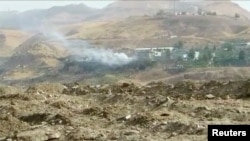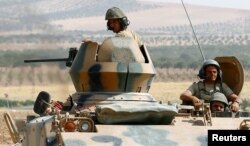The Kurdistan Workers Party (PKK) claimed responsibility on Friday for a truck bombing at a security headquarters in Cizre, in southeastern Turkey near the Syrian border, that killed 11 officers and injured dozens more.
The attack, days after Turkish forces deployed into Syria, is seen as a harbinger of a PKK offensive.
Ankara is targeting Islamic State, as well as calling for the withdrawal of a Syrian Kurdish militia it claims is linked to the PKK.
Ertugral Kurkcu, a member of parliament for Turkey’s pro-Kurdish HDP, said the intervention is a continuation of a policy of attacking Syrian Kurds in their self-declared region of Rojava.
Providing support
“They are providing material and human support for the Jihadist campaign against Rojava. This is the Turkish government’s foreign policy toward Syria," Kurkcu said.
Ankara strongly denies the allegation of supporting jihadists, but it accuses the Syrian Kurdish militia, the YPG, and its political wing, the PYD, of being an extension of the PKK, and claims it is seeking to carve out an independent state along its border.
Turkey fears the group's presence will incite its own restive Kurds, many of whom live close to the Syrian frontier.
Experts say much of the YPG forces are made up of PKK members and the threat of the PKK retaliating in Turkey is a growing risk.
Before the Turkish deployment into Syria, retired Turkish Brigadier General Haldun Solmazturk, a veteran of the PKK conflict, said any operation against the YPG risked reprisals in Turkey.
“The security of the rear area that is inside Turkish borders would probably constitute a challenge," Solmazturk said.
A senior Turkish official, speaking on condition of anonymity via the communications application WhatsApp, claimed the government wanted to intervene earlier in Syria but blamed those responsible for last month’s military coup for blocking the operation.
Political climate
Observers say military officers in the current political climate will now likely be reluctant to question the ongoing operation.
Political columnist Semih Idiz, of Turkey’s Hurriyet Daily News and Al Monitor website, said that even though the military has been sidelined following the failed coup, Turkish security forces remain capable.
"With the military in such a situation it becomes harder, but it doesn't become impossible," Idiz said. "A significant part of war in the southeast against the PKK was, of course, the military, but there was also a heavily armed special branch police force which are heavily armed with heavy weaponry and even helicopters.”
Ankara is continuing to reinforce its presence in Syria, with pro-government newspapers claiming Turkey could increase its deployment in Syria from the present 500 to more than 15,000 soldiers.
Such a growing presence, observers say, increases the risk of clashes with Syrian Kurdish forces, which could result in the PKK stepping up its operations in Turkey.





